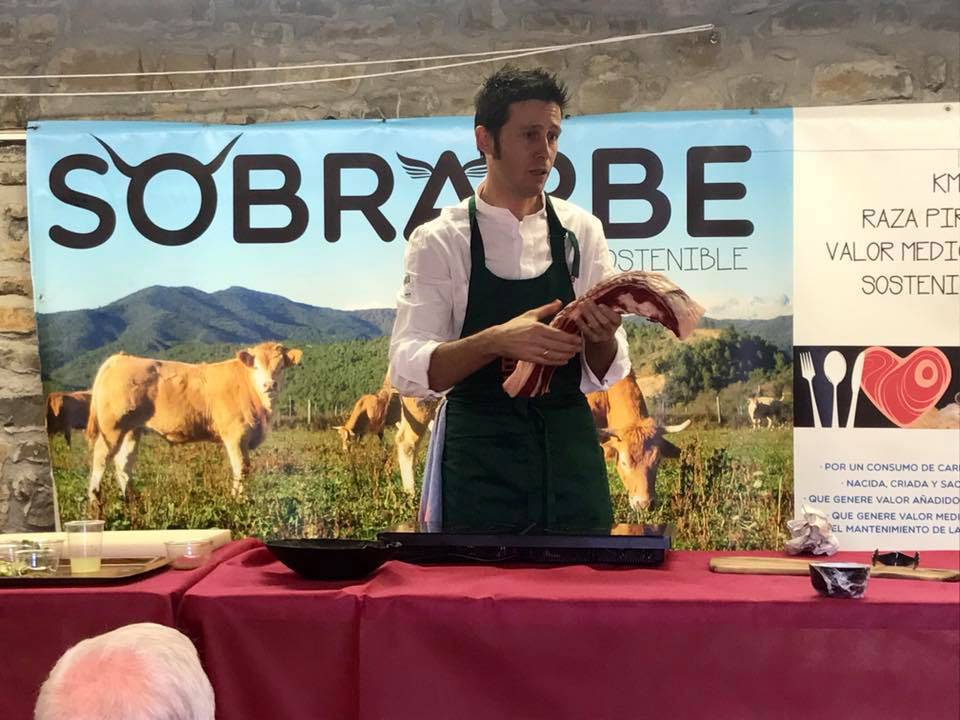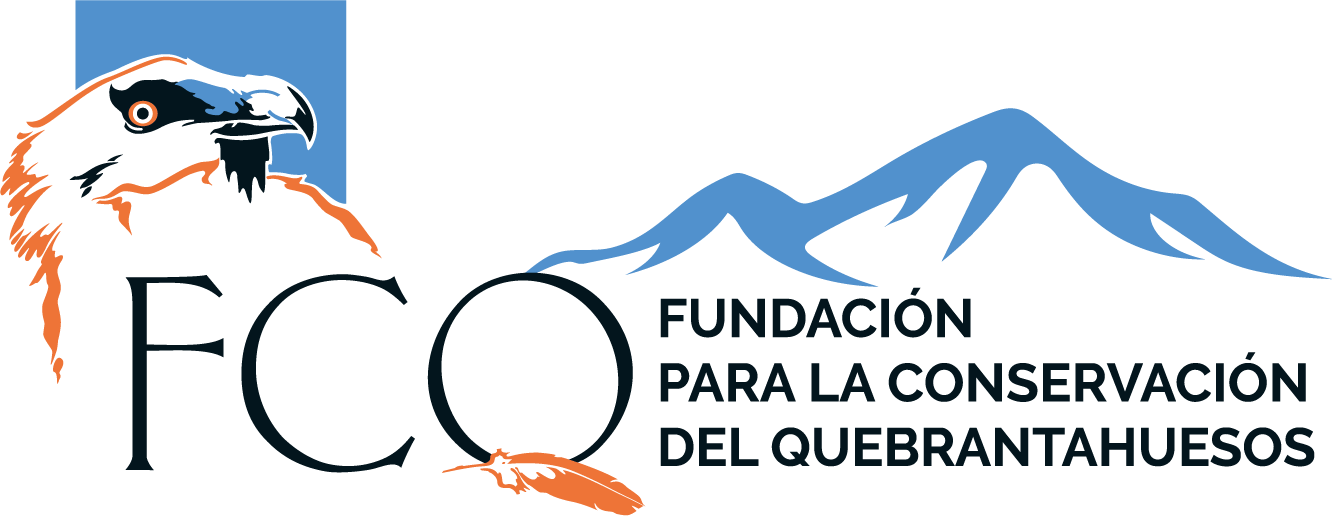
COOPERATION GROUP “SOBRARBE AUTOCHTHONOUS AND SUSTAINABLE” 2016-2018
The Foundation for the Conservation of the Bearded Vulture (FCQ) and the Aragonese Association of Pyrenean Breed Cattle Breeders (ASAPI), join forces with the support of the Aínsa Town Council, owner of the municipal slaughterhouse, the University of Zaragoza and the Sobrarbe Businessmen Association to encourage the consumption of Pyrenean Breed meat km 0, born, raised and slaughtered in Sobrarbe itself, thus facilitating contributions to the necrophagous bird feeder managed by the FCQ in Aínsa and closing a circle of development and sustainability that includes livestock farming, restoration and environmental conservation.
The Cooperation Group has the economic support of the PDR of Aragon 2014-2020, Order DRS/548/2016 by which grants were called to support cooperation actions of agents of the agricultural sector.
The duration of the project is 3 years 2016-2018 and has a financial support of 80% of the total cost of the project amounting to 60,000 euros. THE COOPERATION PROJECT “AUTONOMOUS AND SUSTAINABLE SOBRARBE” The main objective of the project is to promote the consumption of Pyrenean Cattle Breed km 0 meat in a sustainable and synergic way with the environment.
The Pyrenean Cattle Breed is an autochthonous breed of Aragon, which was on the verge of disappearing in the 60’s of the last century.
Today, little by little, with the effort of the associations that work for the diffusion and improvement of the breed, its recovery continues.
The actions to promote the consumption of its meat will be developed in the town of Ainsa and its surroundings.
The conservation and maintenance of an autochthonous breed requires the revaluation of its role as a guarantor of biodiversity, its coexistence with the surrounding environment and the revaluation of its final product.
In this project, we will work on the three lines, adding to the 31 years of work of ASAPI, the accumulated experience in environmental awareness of the Bearded Vulture Conservation Foundation and the studies of meat quality and viability of the farms of the University of Zaragoza. PROJECT OBJECTIVES
- KM 0 CONSUMPTION PROMOTION
- SOCIOECONOMIC STUDY OF THE PROJECT’S IMPACT
- ADDING SYNERGIES BETWEEN LIVESTOCK FARMING, THE END CONSUMER AND THE ENVIRONMENT
- PROMOTION OF THE NECROPHAGOUS BIRD FEEDER OF AINSA-SOBRARBE
KM 0 MEAT CONSUMPTION PROMOTION The concept of zero kilometer consists of minimizing the consumption of external energy (transport, fuel, labor) in order to reduce pollution and lower the cost of the product.
It also implies the cultural promotion of the autochthonous and local as a means of establishing the values of what is local, within a universal framework.
Education is one of the instruments that can best contribute to making correct and responsible choices that satisfy our needs and aspirations.
Thus, through education we can reconcile the concepts of consumption, freedom and responsibility.
Education for sustainable consumption is essential to empower individuals and groups by providing appropriate information about the impact of their daily consumer choices and alternative solutions that work.
*Training on cutting, new cuts and presentations, both for professionals and consumers, to facilitate the use of those pieces that are less commercially viable.
*Competition and promotion of recipes (local and from other places) to both professionals and consumers, with the aim of promoting the consumption of different cuts, as well as promoting different types of cooking.
*Characterization of Pyrenean Breed beef, tastings, samplings.
Comparative study with other meats.
*Edition of informative material *Promotion of the municipal slaughterhouse, with the aim of optimizing resources, as well as certifying it as organic. SOCIO-ECONOMIC STUDY OF PROJECT IMPACT *Analyze the attitudes or opinions of the different agents in the local Pyrenean beef value chain, from the producer to the consumer, on calf finishing and meat production.
*To evaluate the integral sustainability (economic, social and environmental) of Pyrenean beef farms located in Sobrarbe. TO ADD SYNERGIES BETWEEN FARMERS, END CONSUMER AND ENVIRONMENT Sobrarbe, autochthonous and sustainable, is an example of cooperation between farmers, local and regional administration, NGOs and civil society, which aims to bring consumers closer to all the links in the chain, from the farmer’s work in his farm, to the final product, including the coexistence between farmers and wildlife, for which purpose, several visits will be made, as well as the design of advertising material linking the different links.
*Design of a calendar of visits both to the farms and to the necrophagous bird feeder of Aínsa-Sobrarbe.
*Publication of informative material.
*Design of a card associated with the consumption of local beef in restaurants, with the support of the hotel and catering sector, supervised by the farmers themselves with the endorsement and coordination of the breeders’ association. PROMOTION OF THE AINSA-SOBRARBE BIRD FEEDER Necrophagous birds of prey produce significant energy savings by avoiding the transport and incineration of hundreds of livestock carcasses: only what is ingested by a single vulture (182 kg per year) represents an annual saving of 55.7 l. of diesel fuel and the emission of fuel oil.
of diesel fuel and the emission of 177.3 kg of CO2 into the atmosphere. There is also a benefit and impact on eco-tourism since the presence and possibility of observing these birds, most of them absent in the rest of the EU countries, is a great attraction for the visitor-tourist who identifies a nature destination such as the Pyrenees with the presence of wildlife.
There are also cultural and educational benefits because necrophagous birds are present in much of the livestock culture of rural Spain.
Extensive livestock farming establishes a very special link in its management that involves the elimination of carcasses by scavenger birds in the so-called “muladares”, a livestock tradition passed down for generations and in which scavenger birds are just another part of this secular relationship that is mutually beneficial.
On the other hand, this feeding trough is also a first-rate educational resource, thanks to which training and educational visits from the entire educational sector are attended (more than 600 students in recent years).
In Spain there are 80% of the scavenger birds in the EU.
Of these, in Aragon we find: -Buzzards 86 pairs (24 pairs Sobrarbe, FCQ data) -Tawn Vulture 5174 pairs (300 pairs Sobrarbe) In Spain it is estimated that vultures are able to consume about 5551-8326 tons of meat from each year, with an economic saving of approximately 907,679-1,488,719 euros.
During 2013, 1500 tons of feed are provided to the 51 feeders of the RACAN.
In the Sobrarbe region there are six feeding troughs: Aínsa (managed by FCQ, 20,000 kg per year), Laspuña, Plan, Escuaín, Asín de Broto and Torla.
Throughout the project, different measures will be developed to facilitate and promote visits to the Aínsa feeding trough.
*Calendar of visits.
*Publication of informative material.
*Conditioning and improvement of the observation point. PROJECT PROGRESS2016: Previous design meetings, drafting of the project, first designs, planning of the actions to be developed in the project and first informative talks. 2017: Informative talks, adaptation of the trough observation point, meat characterizations, training and informative sessions. 2018: Feasibility studies and socioeconomic impact of the project, conclusions.

